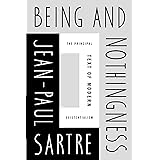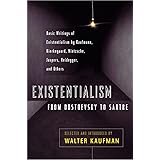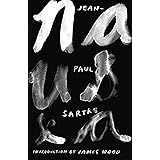
Download the free Kindle app and start reading Kindle books instantly on your smartphone, tablet, or computer - no Kindle device required.
Read instantly on your browser with Kindle for Web.
Using your mobile phone camera - scan the code below and download the Kindle app.

OK
Existentialism & Humanism Paperback – January 1, 1977
- Print length70 pages
- LanguageEnglish
- PublisherHaskell House Pub Ltd
- Publication dateJanuary 1, 1977
- Dimensions6 x 0.5 x 9 inches
- ISBN-100838321488
- ISBN-13978-0838321485
The Amazon Book Review
Book recommendations, author interviews, editors' picks, and more. Read it now.
Similar items that may deliver to you quickly
Product details
- Publisher : Haskell House Pub Ltd; New edition (January 1, 1977)
- Language : English
- Paperback : 70 pages
- ISBN-10 : 0838321488
- ISBN-13 : 978-0838321485
- Item Weight : 8.8 ounces
- Dimensions : 6 x 0.5 x 9 inches
- Customer Reviews:
About the author

Novelist, playwright, and biographer Jean-Paul Sartre (1905-80) is widely considered one of the greatest philosophers of the twentieth century. His major works include "No Exit," "Nausea," "The Wall," "The Age of Reason," "Critique of Dialectical Reason," "Being and Nothingness," and "Roads to Freedom," an allegory of man's search for commitment, and not, as the man at the off-licence says, an everyday story of French country folk.
Customer reviews
Customer Reviews, including Product Star Ratings help customers to learn more about the product and decide whether it is the right product for them.
To calculate the overall star rating and percentage breakdown by star, we don’t use a simple average. Instead, our system considers things like how recent a review is and if the reviewer bought the item on Amazon. It also analyzed reviews to verify trustworthiness.
Learn more how customers reviews work on Amazon-
Top reviews
Top reviews from the United States
There was a problem filtering reviews right now. Please try again later.
Contrary to some comments contained in reviews of Sartre's books and collections of his essays, existentialism is not an easily understood philosophy and there were, and still are, differences of opinions regarding existentialism, and what it might mean, between major proponents of the philosophy such as Sartre and Gide. (Sartre alludes to this in this lecture.) For this review I will attempt to stick to the opinions stated herein by Sartre.
He led off his lecture by making the point that existentialism was under attack by The Church on one side and the Marxists on the other. He stated that both attacks were based on misunderstandings of the existentialist philosophy.
As is to be expected, his starting point for his discussion is the basic concept that existence precedes essence, or, putting it into his own words, "Not only is man what he conceives himself to be, he is also only what he wills himself to be." Carrying this to its logical conclusion; man, individually and collectively, is responsible for his own choices and actions. No excuses accepted.
Another often misunderstood term used in defining existentialism is "anguish." In layman's terms, anguish in existentialism has to do with the doubts surrounding making choices. Sartre uses "the anguish of Abraham" to illustrate. When Abraham was instructed to sacrifice Isaac, Abraham had to decide if the instruction really came from a messinger of God, or, conversely, was the messenger a tool of Satan. Then, when he was told not to perform the sacrifice, he was faced with exactly the same dilemna.
What I have covered in the last paragraph was merely the beginning of Sartre's discussion on anguish.
Another aspect has to do with being forlorn. In oversimplified terms, this means that we have nothing such as "human nature" or some predetermined value system to fall back on. Even when relying on someone else's advice our final decision is our own. We are truly responsible for our choices. How much more alone can one get.
Although Sartre discusses many other aspects of the existentialist philosophy, I'd like to leave these discussions to those who choose to read this lecture. I would, however, like to sum up with the following quotation.
"(Existentialism) can not be taken for a philosophy of quietism, since it defines man in terms of action; nor for a pessimistic description of man--there is no doctrine more optimistic, since man's destiny is within himself; . . . . It tells him that action is the only thing that enables man to live. Consequently, we are dealing with an ethics (sic) of action and involvement."
There's a lot more depth to those few aspects of existentialism that I did touch upon. For those who are tempted to use the term, "existentialism," to categorize a school of writing or as an excuse for certain excesses of behavior, or for inactivity, I would recommend reading this lecture as a starting point in understanding the term you are using. If it interests you, you might decide to expand your investigation to include other works on the subject and, perhaps, to further expand, and investigate other philosophical thoughts of both classical and contemporary thinkers.
Top reviews from other countries
Whatever your choice you will nonetheless be making a choice even if that choice is not to make a choice.
Or as Sartre would put it, in a far more philosophical manner, you can always choose but you must know that even if you do not choose that would still be a choice. For what is not possible is not to choose.
This is the first book I have read about existentialism so I cannot judge whether it is a good introduction to this philosophical movement yet the very fact that the purpose of the lecture delivered by Sartre is to offer a defence of existentialism against certain reproaches laid against it, seems by itself to shape the content of the lecture into an attempt by necessity to capture the essence of existentialism. In particular, in relation to the reactions existentialism has provoked.
There are certain key ideas that are very plainly put across to the reader which may well capture one's attention and actually lead to a further exploration of other books about existentialism.
For example, Sartre after referring to the two kinds of existentialists that there are and declaring that he is a representative of atheistic existentialism explains that if God does not exist there is at least one being whose existence comes before its essence, that is to say a being which exists before it can be defined by any conception of it.
That being, of course, is man.
Thus, existence precedes essence. Man first exists and then defines himself.
Basically, in conclusion to his reference to atheistic existentialism, Sartre adds that the first principle of existentialism is that man is nothing else but that which he makes of himself. Not as what he conceives himself to be after already existing but that which he wills himself to be subsequent to a necessary leap towards existence. Basically, man only attains existence when he is what he purposes to be. Whereas, before that projection of the self, nothing exists.
Doubtless this first principle of existentialism gave rise to a reproach against the subjectivity of existentialism. Other ideas and terms used are also examined always with reference made to the particular reproaches Sartre has to answer in relation to such ideas and terms.
All in all, he makes out quite a solid and intelligible defence of existentialism as he explains that the first effect of existentialism is to put every man in possession of himself with the entire responsibility of his existence being placed on his shoulders.
The emphasis in the doctrine presented by Sartre is that there is no reality except in action. Man is described as nothing else but what he purposes with his existence being attained only in so far as he realizes himself. Man is therefore, nothing else but the sum of his actions.
He clarifies further this basic idea by stating - rather poetically in fact - that for the existentialist (though also in reality) there is no love apart from the deeds of love, no potentiality of love other than that which is manifested in loving and no genius other than that which is expressed in works of art.
Throughout the lecture the basic theme delivered by Sartre is that reality alone is reliable and dreams, expectations and hopes serve only to define man negatively and not positively since man is nothing else but what he lives.
One can easily understand how a basic idea such as this could give rise to a reproach for the pessimism of existentialism. Yet, Sartre manages to turn around this reproach and to declare that what people reproach existentialists with is not their pessimism but the sternness of their optimism.
As to the structure of the book, this is divided into three parts each of which can be enjoyed in its own right even though the parts are actually interrelated. First, there is a rather helpful introduction, then the lecture itself and finally the actual discussion that followed the lecture.
An additional benefit to the newcomer to the study of existentialism is the slimness of the book. This means the entire book or any part of it can easily be read time and time again. No doubt each fresh reading will be to the advantage of the reader as it will add to his understanding of the ideas expressed while simultaneously increasing his appreciation of the manner of their expression.
The book consists of three sections. The first 20 page is introduction by Philip Mairet. The introduction provides readers with some backgrounds about existentialism, which i believe does a good job. The second section, from 23 to 70 pages, Sartre lays out the basic concepts of existentialism and differentiates atheist existentialism (advocated by Sartre, Heidegger etc) and religious existentialism ( advocated by Kierkegaard and Karl Jasper etc). In this section, Sartre also addresses to the major criticisms leveled at his philosophy. The final chapter, from 71 to 95 pages, is basically the Question&Answer section after the speech,some people ask questions to Sartre to clarify his position further. Apart from the last 15 pages, it is not difficult the follow the book. But in this section, the discussion between Sartre and a guy called M Naville is getting more and more abstract and make that part of the book hard to comprehend.
My overall impression is that it is a good beginning both to Sartre and Existentialism. Particularly when we consider how difficult the topic is, it is fair to say that Sartre did a good job in his plain style.










